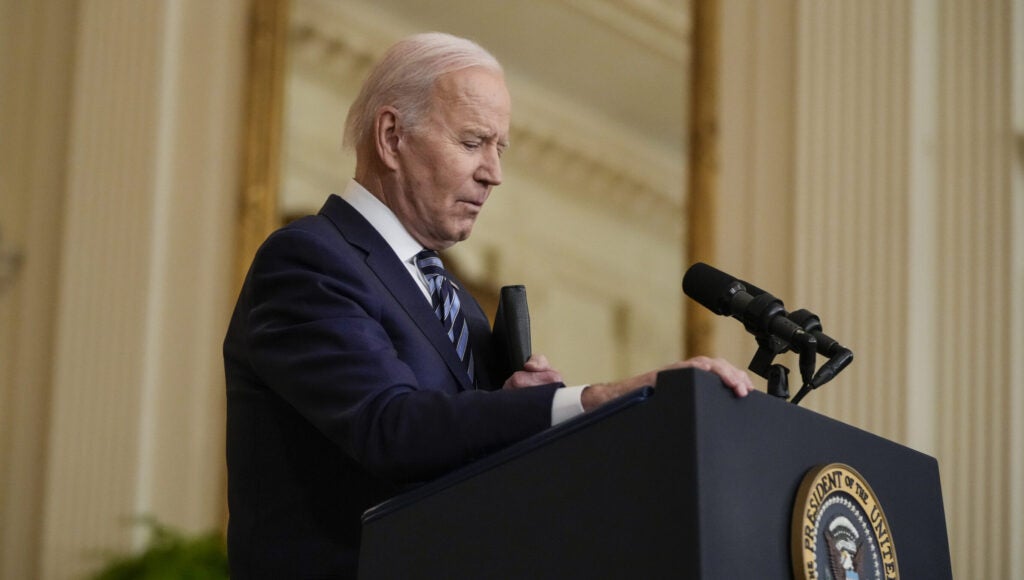In February 2014, Russian kingpin Vladimir Putin invaded and subsequently annexed the Crimean Peninsula, which had been under Ukrainian jurisdiction.
The timing was no accident, coming as it did only a handful of months after then-President Barack Obama reneged upon his own chemical weapons “red line” for Syrian dictator Bashar Assad, effectively leaving the resolution of the then-nascent chemical weapons crisis in Putin’s hands. Putin, like a shark smelling blood, sensed weakness and acted accordingly.
To this day, Crimea remains under de facto Russian control.
It is not exactly a mystery what motivates Putin’s actions on the geopolitical chessboard. He is a former KGB operative who has publicly bewailed the dissolution of the Soviet Union as one of the greatest tragedies in modern world history.
If Putin had his druthers, “Mother Russia” would once again become “Greater Russia”—likely including all the ethnic Slavic portions of Central and Eastern Europe. And as the world saw in Crimea, Putin will act on those druthers when he is emboldened by a seeming lack of deterrence.
This shark smells blood—lots of it.
It is thus no great surprise that, just as he did during the reign of the last feckless Democratic president, Putin has once again decided to take chunks of Ukraine and redraw the post-Cold War maps to better reflect his conception of Greater Russia.
There was, in the seemingly endless lead-up to Russia’s decision to send tanks into the Donbas (as of this writing, now heading toward Kyiv), remarkably little appetite for firm deterrence from the U.S. or anyone else in NATO.
President Joe Biden promised sanctions—an only arguably effective tool, at best, and which largely amounts to performative preening so that State Department lackeys and nongovernmental organization staffers can sleep better at night. Meanwhile, British Prime Minister Boris Johnson, deeply unpopular on the home front, penned a condemnatory Wall Street Journal op-ed. Yawn.
It is difficult, perhaps impossible, to overstate the utterly pathetic nature of the Biden presidency thus far. To merely call him feckless or incompetent would be insufficient. Some on the right like to ask if a conservative politician “knows what time it is,” proverbially speaking, but the doddering dolt who is America’s commander in chief likely does not even know what year it is.
His presidency is a disgraceful exercise in how to do everything wrong: the highest inflation in decades, out-of-control spending, supply chain crises and mass product shortages, a humiliating and botched Afghanistan withdrawal, and the terrorist Iranian regime racing toward a nuclear weapon. Biden’s is the “Murphy’s law” presidency—anything that can go wrong has indeed gone wrong.
One readily imagines Chinese President Xi Jinping fondly looking out over the Taiwan Strait, salivating over the prospect of reunifying the Republic of China with the People’s Republic of China. Who will stop him? Surely not the senile leader of a political party that counts the promotion of transgender rights and the dissemination of the civilizational arson that is critical race theory as its seemingly highest political priorities.
Biden also teamed up last summer with former German Chancellor Angela Merkel to give Putin a massive win on Russia’s coveted Nord Stream 2 pipeline, which spans 764 miles across the Baltic Sea. Biden’s capitulation on Nord Stream 2, abetting Germany’s unquenchable desire for more Russian natural gas at the expense of piqued allies such as Poland, presaged the timing of Putin’s most recent Ukrainian blitzkrieg.
Biden’s bestowing an American imprimatur to Nord Stream 2 was a legitimizing event for both Putin and for Russia, which in its modern post-Cold War form roughly resembles a Persian Gulf-style petrostate.
The way to deter and combat Russian hegemony is through the means of energy policy and energy diplomacy. Unfortunately, as the case may be, Biden last year put the kibosh on the Keystone XL pipeline here in the U.S. The combination of nixing Keystone XL while signing off on Nord Stream 2 was, and remains, indefensible.
The American national interest is not necessarily tremendously affected, one way or the other, by the fate of the Donbas. Our Central and European allies would strongly prefer Ukraine and Belarus (a Russian puppet state, as presently governed) be kept intact as buffer zones. But Ukraine—like Russia, a deeply corrupt and oligarchy-driven society—is not a NATO member.
There are crucial legal, strategic, cultural, and historical differences between Russian tanks rolling into the Donbas, on the one hand, or rolling into Warsaw or Budapest, on the other hand.
What’s more, if one takes seriously the hysterical shrieks of “liberal democracy is on the line!” that have recently become a cable news talking-head staple, it is curious that even our foremost Western European allies seem asleep at the wheel. Where, exactly, are the British and the French?
The oligarchic Russian petrostate is not China, which poses the greatest geopolitical threat to the U.S. by a longshot. But the Russian bear being on the loose in Europe is lamentable nonetheless. Pray for peace—and for a change of U.S. presidential leadership posthaste.
COPYRIGHT 2022 CREATORS.COM
Have an opinion about this article? To sound off, please email letters@DailySignal.com and we’ll consider publishing your edited remarks in our regular “We Hear You” feature. Remember to include the URL or headline of the article plus your name and town and/or state.
